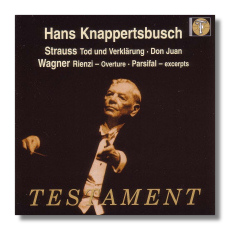
The Internet's Premier Classical Music Source
Related Links
- Latest Reviews
- More Reviews
-
By Composer
-
Collections
DVD & Blu-ray
Books
Concert Reviews
Articles/Interviews
Software
Audio
Search Amazon
Recommended Links
Site News
 CD Review
CD Review
Knappertsbusch Conducts

- Anton Bruckner: Symphony #3 in D minor (1890 version)
- Richard Wagner: Siegfried Idyll
Vienna Philharmonic Orchestra/Hans Knappertsbusch
Testament SBT1339 73m


Anton Bruckner
Symphony #4 in E Flat Major "Romantic"
Vienna Philharmonic Orchestra/Hans Knappertsbusch
Testament SBT1340 60m


- Richard Strauss:
- Tod und Verklärung, Op. 24
- Don Juan, Op. 20
- Richard Wagner:
- Overture "Rienzi"
- Parsifal (Excerpts)
Orchestre de la Societe des Concerts du Conservatoire/Hans Knappertsbusch
Testament SBT1338 79m
These three discs, recorded 1950-56, are glorious examples of the artistic interpretations of the great Hans Knappertsbusch who informs these classic Austro Hungarian monoliths with a craggy grandeur that is unequalled elsewhere. The recordings date from the heyday of Decca's sonic history and also are an advocate for the mono sound that is, at times, better than the latest state of the art digital recordings.
These two Bruckner symphonies were briefly available on the defunct Eclipse LP series and partner another discredited Fifth Symphony that was played in a truncated Schalk/Loewe edition also available on a Decca Classic Sound reissue. Although the versions are admittedly rather shockingly corrupt, Knappertsbusch creates a palpable sense of beauty and utter mystery especially in the wonderful opening bars of the Third and the emotional coda to the Fourth which (complete with cymbal clash) is utterly beautiful in its sense of old fashioned grandeur.
Knappertsbusch was something of a Richard Strauss expert and his recordings with the Orchestre de la Societe des Concerts du Conservatoire are an example of this expertise. 'Tod und Verklärung' moves along with unsentimental grandeur but the final moments are also palpably glorious with the French brass truly rising to the occasion. The same could be said of an energetic and lithely crafted 'Don Juan' that is also quite memorable in the astonishing early stereo sound.
'Parsifal' was definitely Knappertsbusch's 'hors conceurs' and these short excerpts from the opera sing with the deep spirituality that informs the classic Bayreuth recording from 1962. The Prelude is all of 14 minutes long but the sense of Wagnerian line and expansion is never in doubt. A similarly taut 'Siegfried Idyll' is the filler to the Bruckner Third. Although it would be obviously important to have alternative recordings of these works, especially the Bruckner symphonies, these versions are highly recommended for their heart on sleeve experience that are demonstrations from a bygone era.
Copyright © 2004, Gerald Fenech


















